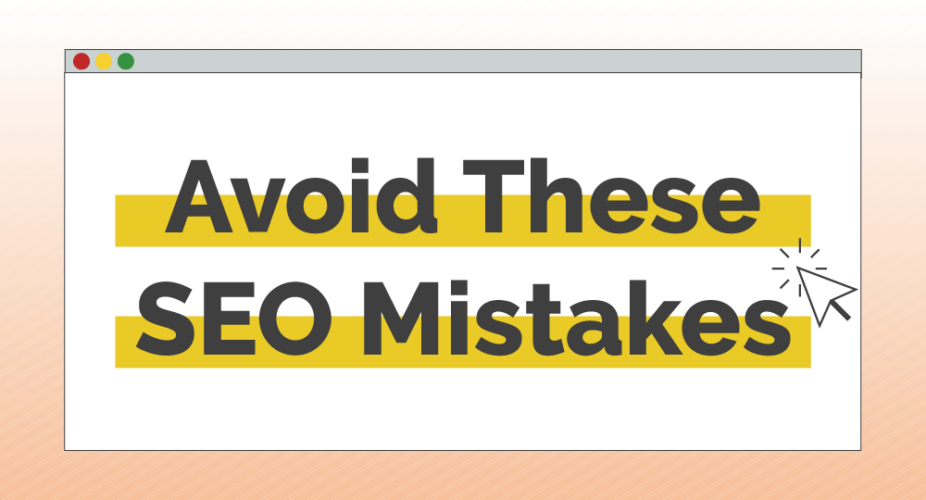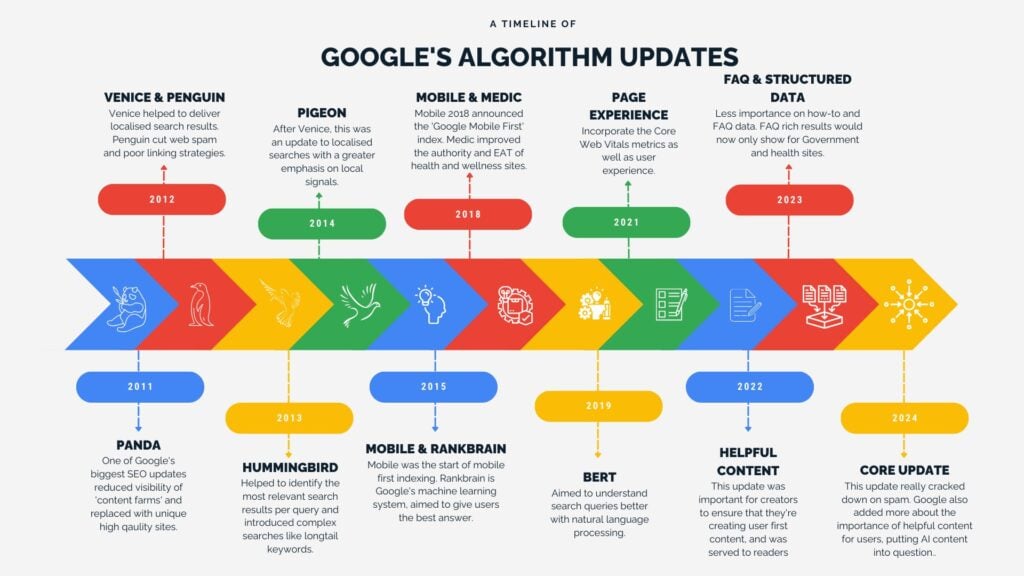As we move into 2025, SEO continues to change rapidly. Keeping up with best practices is critical for improving visibility, driving traffic, and maintaining strong search rankings. Avoiding top SEO mistakes can be the deciding factor between success and falling behind your competitors. This guide outlines six of the most common SEO problems and how to stay ahead of the competition with your organic traffic.
1. Skipping E-E-A-T Considerations
What is E-E-A-T?
E-E-A-T represents Experience, Expertise, Authoritativeness, and Trustworthiness. These are the standards Google uses to assess the quality and relevance of content.
Why It Matters in 2025
Google’s evolving algorithm focuses on identifying content that answers user queries accurately and demonstrates credibility and expertise. Pages that are well-researched, feature authoritative references, and are backed by real-world experience are Google’s favorites – with a higher chance of ranking. By rewarding this type of high-quality content, Google aims to improve the user experience and ensure that search results are reliable, trustworthy, and relevant. Establishing trust with your audience through transparency, authenticity, and value-driven content is now a cornerstone of achieving and maintaining top rankings.
How to Avoid This Pitfall
- Add author bios that emphasize credentials and subject matter expertise.
- Cite reputable external sources to support claims.
- Build quality backlinks to boost credibility.
- Focus on content that demonstrates deep knowledge in your field.
2. Ignoring Core Web Vitals & User Experience
What Are Core Web Vitals?
Core Web Vitals measure website performance through:
- LCP (Largest Contentful Paint): Page load speed.
- FID (First Input Delay): Interactivity.
- CLS (Cumulative Layout Shift): Stability of content as it loads.
Why It Matters in 2025
Websites that prioritize speed, responsiveness, and seamless functionality align with Google’s focus on user satisfaction. Slow-loading pages or any with unstable layouts only serve to frustrate your visitors and send negative signals to search engines (making your ranking go down). By providing fast load times, reducing delays in user interactions, and continuing consistent visual stability, websites can improve user retention and engagement. These performance metrics, measured through Core Web Vitals, are critical for achieving higher rankings and staying competitive in search results.
How to Avoid This Pitfall
- Optimize images and reduce file sizes to improve load speed.
- Minimize JavaScript and prioritize lightweight code for better responsiveness.
- Use responsive design to maintain consistency across devices.
3. Underestimating Content Freshness
What is Content Freshness?
Content freshness refers to keeping your website’s content relevant and up-to-date. Older material often loses visibility and lowers traffic if not regularly reviewed.
Why It Matters in 2025
Search engines and users alike prioritize content that is relevant, trustworthy, and up-to-date. Accurate and applicable information not only satisfies user queries but also reinforces trust and credibility (both are key to long-term engagement)! On the other hand, outdated posts create a muted user experience, leading to higher bounce rates and lower trust in your site’s authority. For search engines, stale, boring, or irrelevant content signals neglect, which can result in limited visibility, traffic, and overall rankings. Regularly refreshing and updating content ensures it remains valuable and competitive in search results.
How to Avoid This Pitfall
- Regularly audit your website for outdated material.
- Refresh content with updated data, examples, and visuals.
- Republish revised pages to improve their performance.
4. Not Considering Search Intent Shifts
What is Search Intent?
Search intent refers to understanding what users are looking for when they type a query-whether that’s gathering information, purchasing a product, or shopping comparisons.
Why It Matters in 2025
Search habits are constantly changing as users become more specific and detailed in their queries. With advancements in technology and changing user expectations, searchers now seek highly relevant, context-driven answers tailored to their intent-whether it’s informational, transactional, or navigational. If your content doesn’t align with the intent behind a search, users are likely to leave your site fairly quickly, resulting in higher bounce rates and lower engagement metrics. This mismatch signals to search engines that your content isn’t meeting user needs, leading to a negative impact on those rankings. To remain competitive, understanding and adapting to these shifts is crucial, ensuring your content provides value and resonates with your target audience.
How to Avoid This Pitfall
- Use tools like Google Search Console to track how users interact with your content.
- Adjust pages to match informational, transactional, or navigational needs.
- Research trends to predict changing user preferences.
5. Relying Solely on Google’s Updates
Proactive SEO is Essential
Waiting for Google updates to guide your SEO strategy can put you at a disadvantage. Staying ahead of changes is the key to long-term success.
Why It Matters in 2025
Algorithm updates are becoming increasingly complex, often targeting subtle aspects of user experience, content relevance, and technical optimization. These updates can lead to sudden and significant changes in search rankings, leaving unprepared websites struggling to regain visibility. A proactive strategy allows your site to adapt continuously, confirming it meets the latest SEO standards and minimizes the risk of traffic drops. By conducting regular audits, analyzing competitors, and integrating user feedback, you can build resilience against unexpected changes while maintaining a competitive edge. Preparing for the unpredictable is essential for staying ahead.
How to Avoid This Pitfall
- Conduct SEO audits regularly to identify potential weaknesses.
- Analyze competitors’ strategies to uncover new opportunities.
- Incorporate user feedback to keep your site relevant and useful.
6. Neglecting Schema Markup and Structured Data
What is Schema Markup?
Schema markup helps search engines understand the context of your content, making it eligible for rich results like FAQs, star ratings, and more.
Why It Matters in 2025
Rich results play a pivotal role in boosting a website’s visibility and engagement in search engine results pages. These listings-such as FAQs, product ratings, and how-to snippets-pull in users by offering valuable, concise information directly in the search results. As search engines prioritize structured data to improve user experience, websites with rich results are more likely to stand out from competitors. By increasing click-through rates, rich results drive more organic traffic while signaling relevance to search engines, which can further improve rankings. In 2025, leveraging structured data effectively will be essential for maintaining a competitive edge and maximizing search visibility.
How to Avoid This Pitfall
- Add structured data to key pages, such as products, FAQs, and blogs.
- Validate your schema with tools like Google’s Rich Results Test.
- Focus on commonly used schema types like product and FAQ.
Final Thoughts
By avoiding these common SEO issues, your site will be better positioned to succeed in 2025. A well-rounded strategy that prioritizes user experience, quality content, and technical optimization will help you stay ahead of the competition.
Ready to get started? Contact Zero Gravity Marketing to learn how we can help refine your SEO strategy!
FAQ
What is the Future of SEO? Expand
SEO will continue to prioritize user experience, high-quality content, and technical improvements like structured data.
How Do I Check My Page Speed and Core Web Vitals? Expand
Use tools like Google PageSpeed Insights and Lighthouse Chrome Extension to analyze performance metrics and identify areas for improvement.
Why is Search Intent Important for SEO, and How Do I Adapt to It? Expand
Search intent ensures your content aligns with user needs, improving relevance and engagement. Monitor trends and update strategies to stay aligned.
Sara Smith
















